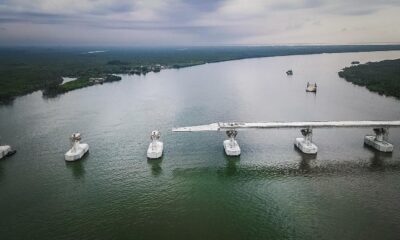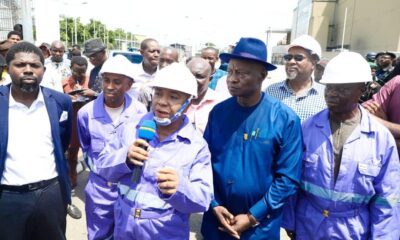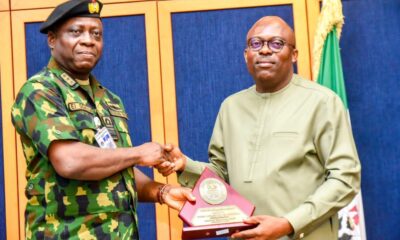Maritime
Customs Commences Use Of Automated System
The Comptroller-Gen-eral of Customs, Mr Abdullahi Dikko, has said the company has commenced the use of automated system for manifest declaration and payments.
Dikko told newsmen recently in Abuja that the new process which would be operated electronically would enhance speedy clearance of cargos at ports.
“We do not need up to 48 hours to clear cargos at the ports.
“ As far as Customs clearance is concerned, one does not need 48 hours before cargo gets out of customs clearance if one has proper documentation,’’ Dikko said.
He said the Federal Government, having listened to the demands of Nigerians had approved the lifting of bans on most items.
“I believe with this, patronage at Nigeria ports is going to be high.
“As you all know some items were not really banned but with what we have now we have automated our system, things are done electronically, so we need less man-power at the ports,” the Customs chief added.
On smuggling activities across the nation’s borders, he said: “we are doing everything within our powers to eliminate smuggling.
“Earlier, we had acquired two helicopters and just acquired 360 Hilux Toyota vans and we are waiting for the cameras,’’ Dikko said.
He said that the cameras would give information on how to locate smugglers at the borders and would also give direct contact with the helicopters.
“We are going to do our best with these vehicles and this measure will reduce the personnel in the ports, so we have a larger number of officers that will mount our borders.
“I assure you that we are really going to cordon off a large area of our borders,” Dikko added.
Maritime
FG Launches National Single Window Steering Committee

President Bola Ahmed Tinubu has said the decision of his administration to embark on a National Single Window (NSW) platform is to boost the country’s Ease of Doing Business Index as rated by the World Bank.
The NSW is an electronic portal that links all agencies and operators within the country’s supply chain to an integrated platform, which is to be domiciled at the Federal Inland Revenue Service (FIRS).
Membership of the steering committee is drawn from the Nigerian Ports Authority (NPA), Nigeria Customs Service (NCS), Federal Airports Authority of Nigeria, (FAAN), Federal Inland Revenue Service, (FIRS), National Agency for Food and Drug Administration and Control, (NAFDAC), Nigerian Maritime Administration and Safety Agency, (NIMASA), Central Bank of Nigeria (CBN), Standards Organisation of Nigeria (SON), and some key private sector operators, which include importers, exporters, shipping lines, freight agents and banks.
Speaking while inaugurating the steering committee for the project at the Presidential Villa, Abuja, the President also said the platform is aimed at eliminating all forms of encumbrances to trade and commerce with a view to optimising revenue generation and ultimately boost the inflow of both local and foreign direct investment into the country.
The President, who decried the bottlenecks that characterise the country’s import, export and other supply chain activities, noted that the project is another milestone by his administration, saying the project would boost investment inflow by removing all forms of trade barriers in the import and export value chain.
“Nigeria’s import and export processes are bureaucratic, which lead to delays at the seaports. Such inefficiencies have adverse impacts on local businesses in the country and serve as potential impediment for foreign direct investments.
“To eliminate these challenges, today, we are launching the National Single Window project.
“The National Single Window Project is intended to enhance revenue generation through imports and exports and accelerate economic activities in the country.
“This project is a bold initiative to simplify and streamline our import and export clearance processes by eliminating bottlenecks, and harnessing best-in-class technology. This will result in reduced costs of doing business and position us to attract more foreign investment.
“The National Single Window Project will consist of four key pillars, namely: Single Window for Imports, Single Window for Exports, Port Community System and Scanning Services across our sea, air and land borders.
“The Project is not merely a technological advancement, but a strategic initiative to increase revenue generation by consolidating import and export related procedures into a unified electronic platform.
“The platform will serve as a single portal for the submission and approval of all import and export related documents, as well as a centralised payment system. It will be integrated with the various systems in the Ministries, Departments and Agencies (MDAs) involved in the import and export processes.
“The National Single Window project is a top priority for this Administration. As a result, I am directing all relevant Ministries, Departments and Agencies working on similar systems or information technology implementation projects to stop doing so in silos but align and consolidate such projects under the National Single Window Project’s scope.
“Today, I am also inaugurating the National Single Window project steering committee. The primary objectives of the Steering Committee are to provide support, oversight, strategic direction, and guidance to ensure the effective implementation of the project.
“You are entrusted with the responsibility of aligning this project with this government’s revenue enhancement objectives, setting the stage for a more efficient and responsive economy.
“I expect nothing short of excellence from this committee. You are the driving force behind the success of this crucial project, and your commitment and dedication will determine its outcome.
“Our collective effort will shape this project and play a key role in shaping the future of trade and commerce in Nigeria. I urge you to approach this task with a sense of purpose, unity, and a shared commitment for the betterment of our nation”, the President said.
Meanwhile, Chairman of FIRS, Zacch Adedeji, who also spoke at the event, thanked President Tinubu for the project and approving FIRS and the Nigeria Sovereign Investment Authority (NSIA) as the project’s implementing agencies and financial managers.
Adedeji said the project aligns with the President’s commitment to stimulating Nigeria’s economy through enhanced trade facilitation and a bold step towards realising the country’s immense economic potential.
“As we strive towards achieving sustainable economic growth, we must embrace high-impact projects such as the National Single Window. By simplifying the government trade compliance process through a cutting-edge digital platform, we will unlock a myriad of economic benefits.
“This initiative will serve as a catalyst for achieving an average Gross Domestic Project (GDP) growth rate of seven per cent annually, propelling Nigeria to new heights of prosperity. The National Single Window is not just a technological advancement; it is the gateway to a more connected, efficient, and transparent system.
“By integrating our seaports, government agencies, and key stakeholders, we will create a seamless ecosystem that facilitates trade, saves time for businesses, and opens up a world of opportunities.
“From providing access to education and healthcare to enabling small businesses to reach global markets, digital connectivity is the key to unlocking Nigeria’s true potential.
“The heavy costs, delays, and inefficiencies at our ports has been a constant burden. It is estimated that a staggering $4 billion annually is lost due to these inefficiencies.
“By addressing revenue leakage prevention and facilitating effective trade, we will reclaim these lost resources and channel them towards the betterment of our society.
“Steering Committee, National Single Window 2 Paperless trade alone is projected to bring an annual economic benefit of around $2.7 billion; a testament to the transformative power of this initiative.
“The success stories of countries that have embraced Single Window systems are evident. Singapore, Korea, Kenya and Saudi Arabia have all witnessed significant improvements in trade efficiency after implementing similar initiatives. It is now Nigeria’s turn to join the ranks of these progressive nations and reap the rewards of a streamlined, digitised trade environment.
“The National Single Window is not just about facilitating trade, it is also a powerful tool for expanding our tax base and capturing the informal e-Commerce sector. By providing a unified, modern digital platform for expeditious paperless cargo clearance and logistics, we will bring more businesses into the formal economy, ensuring that everyone contributes their fair share to our nation’s development.
“Moreover, by linking the Nigerian National Single Window with other African nations, we will expedite cargo movement and optimise intra-Africa trade.
“This will position Nigeria as a leader in regional trade facilitation, fostering stronger economic ties with our neighbors and creating new opportunities for growth and collaboration.
“The current international trade environment is complex, involving disparate systems and requiring an average of 40 documents per transaction. Nigeria’s lack of a comprehensive trade facilitation system has led to bottlenecks, corruption, port delays, decreased revenue, and a negative business environment. The National Single Window is a decisive response to these challenges.
“By improving trade facilitation, revenue generation, economic growth, transparency, security, and streamlined processes, we will transform Nigeria into a global trade powerhouse”, the FIRS boss explained.
Maritime
Lilypond Customs Exports $236m Worth Items In Q1

The Lilypond Export Command of Nigeria Customs Service has said it processed a total of 5,891 containers of export items valued at $236,087,888.53 from January to March 2024.
Comptroller Ajibola Odusanya, Customs Area Controller of the Command, who disclosed this to journalists last Tuesday in Lagos, said the exported items include agricultural produce, manufactured goods, solid and extractive minerals.
While giving a breakdown of the exported items, Comptroller Odusanya said a total of 4,229 containers were filled with agricultural produce, generating earnings amounting to USD$153,426,308.00.
According to him, the Nigeria Export Supervision Scheme (NESS) received a payment of ¦ 916,492,465.00, underscoring the robust contribution of agricultural exports to the national economy.
For manufactured goods, the Command processed 629 which, he said, contributed significantly to export revenue, totaling USD$22,289,340.77 and NESS payment to the Federal Government amounting to ¦ 112,905,501 which is reflecting the sector’s resilience and competitiveness in the global market.
He added that for solid and extractive minerals, there was significant increase, with 753 containers dispatched, valued at USD$34,107,959.01 with a NESS payment of ¦ 224,162,113.74, which highlights the immense potential of Nigeria’s mineral resources on the international stage.
On other goods, he said “Additionally, various goods such as plants & machinery, and personal effects were exported in 280 (20ft and 40ft) containers, contributing USD$26,264,280.07 to export revenue. A NESS payment of ¦ 135,771,439.38 was made, emphasizing the diversified nature of Nigeria’s export portfolio.
“A comparative analysis reveals a substantial growth trajectory in Q1 2024 compared to the corresponding period in 2023.
“Total containers processed in 2024 Q1 surged by 44% to reach 5,891(20ft and 40ft) containers as against 3,784 (20ft and 40ft) containers processed in 2023 Q1, signifying heightened trade activity at the Command.
“Export commodities’ value also surged by 42% to USD$236,087,888.00 as against $154,459,566.39 recorded in 2023 Q1, underlining the sustained momentum in export performance.
“NESS payment witnessed an impressive 114% increase, reaching ¦ 1,389,331,520.15 from ¦ 378,268,430.57 received in 2023 Q1, indicative of enhanced revenue generation and compliance.
“Surcharge payment for plants & machinery, and imported goods doubled from NGN 8,785,188.00 in 2023 Q1 to NGN 18,218,964.00 in 2024 Q1 representing a 70% difference, aligning with fiscal policy directives”, he stated.
Maritime
Tinubu, Others To Honour Global Transport Roundtable

The President of the Federal Republic of Nigeria, Bola Ahmed Tinubu; Governor Babajide Sanwo-Olu of Lagos State, amongst other prominent stakeholders in the Transport sector are set to grace Global Transport Policy Annual Roundtable and bilingual magazine public launch slated for this Wednesday.
They will assemble with other five ministers, including intellectuals , maritime and aviation Giants to brainstorm on a workable solution for the industry.
The Chairman/Chief consultant, Global Transport Policy, Dr. Oluwasegun Musa, disclosed this in Lagos while giving an update on the company’s preparedness for the event at Marriot Hotel, Ikeja, Lagos.
Musa told reporters that the trends and developments in recent times have shown the need for urgent conversation to foster economic growth in the Nigerian transport industry.
Addressing journalists, he said the theme, “Transport Infrastructure and Strategic Policy Intervention: Building Blocks For Economic Growth”, captures the desires of stakeholders in the industry.
“It is a call to action across the spectrum of industry players, including the government, industry technocrats, relevant unions, royal fathers, the academia, diplomats, the press, and every other player critical to the advancement of the industry through dialogue and essential conversation to drive the industry forward.
“As you already know, trends and developments in recent times have shown the need for this urgent conversation to foster economic growth in the transport industry.
“With panel sessions of esteemed stakeholders and critical dialogues around topical issues that spotlight grey areas for strategic inputs for policy interventions, GTP Annual Roundtable is keen on unveiling the critical components of the transport industry as prime enablers for rapid growth.
“Our call has been well received. The President of the Federal Republic of Nigeria is expected to attend. The Lagos State Governor will serve as the Chief Host of the event”.
According to him, keynote addresses will be delivered by, including the Ministers of Transport, Aviation & Aerospace Development; Marine & Blue Economy; Industry, Trade & Investment; and Foreign Affairs.
“The Keynote presentation will be delivered by Dr. Alban Igwe, a seasoned global transport specialist who will be shaping the conversation around the theme for holistic engagement.
“The first Panel session will have critical agencies of government such as Nigeria Railway Corporation (NRC), Federal Airports Authority of Nigeria (FAAN), Nigerian Ports Authority (NPA), and Central Bank of Nigeria (CBN) engage in a roundtable discourse, titled, “Transport And Regional Integration: Assessing the Potential of Transport Infrastructure Development for National Integratio.
“International diplomats from embassies of France, Singapore, the United Kingdom, and the United States will be delivering justice to the second panel session titled, “Intermodal Transport in the 21st Century: Trends, Development, and Policies in Developed Nations”.
Musa continued that “the discourse would also be tackling possibilities for states to engender comprehensive transport growth for economic impact through strategic collaborations to reinforce national advancement.
“It would also serve as the official launch of Global Transport Policy Magazine. It is a bilingual magazine produced quarterly with authoritative trend spotting and compelling cross-cutting analysis”.
Global Transport Policy is aimed at helping local and international governments shape workable policies and perspectives for better outcomes.
This compendium catalogs global trends, events, innovations, challenges, and solutions for holistic analysis and stakeholder engagement with broad industry insight and cutting-edge research.
By: Nkpemenyie Mcdominic, Lagos
-

 News3 days ago
News3 days agoBonny-Bodo Road: FG Offers Additional N20bn, Targets December Deadline
-
Business3 days ago
Nigeria Set To Get $2.25bn World Bank Loan … Plans Diaspora Bond
-

 Niger Delta3 days ago
Niger Delta3 days agoMile One Market: Committee Commences Verification Exercise …Denies Allocations Of Shops
-
Sports3 days ago
Chairman Lauds NPFL Referees Improvement
-

 News3 days ago
News3 days agoJAMB Arrests Father For Impersonating Son At Exam Centre
-
Women3 days ago
The Desire Of Every Woman In Marriage
-

 Featured3 days ago
Featured3 days agoBe Firm In Fight Against Oil Theft, Fubara Tells CNS …As Navy Moves Training Hqtrs To Rivers …Seizes 14 Vessels In Three Months
-
Business3 days ago
Diri Tasks NCDMB, SPDC On Projects Completion

